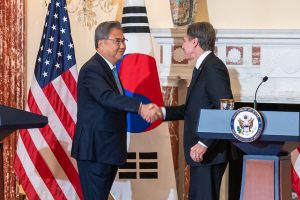South Korean Foreign Minister Park Jin met his U.S. counterpart Antony Blinken on Monday in Washington, D.C. The meeting came three weeks after a summit meeting in Seoul between South Korean President Yoon Suk Yeol and U.S. President Joe Biden, the first since Yoon took office on May 10.
Given the flurry of North Korean missile tests in 2022, Park again conveyed Seoul’s hawkish stance, centered on strengthening South Korea’s alliance with the U.S. and self-defense capabilities against North Korea, during the joint press conference.
“We affirmed that any North Korean provocations, including a nuclear test, will be met with a united and firm response from our alliance and the international community,” Park said.
Reaffirming North Korea issues as one of the top policy priorities for Seoul and Washington, Park warned that “Pyongyang’s continuous provocations will only lead to strengthened deterrence of the alliance and stronger international sanctions measures.”
Unlike the Moon Jae-in administration’s dovish overture on North Korea, which led to three inter-Korean summit meetings in 2018, the Yoon administration has emphasized the necessity of strengthening the military alliance with the U.S. by conducting joint military drills and coordinating powerful corresponding measures against the North’s missile threats. As North Korea is suspected to be preparing to conduct its seventh nuclear test in the coming weeks, South Korean and U.S. officials have successively held meetings in recent weeks to share their assessments and analyses over the North’s restoration activities at its Punggye-ri nuclear site and the various missiles launched in the past weeks.
“The recent increase in Pyongyang’s ballistic missile testing has raised tension throughout the Indo-Pacific region and beyond. We continue to seek the complete denuclearization of the Korean Peninsula,” Blinken said.
Regarding the possibility of Pyongyang conducting its seventh nuclear test, Blinken said that the United States “is prepared to make both short and longer-term adjustments to our military posture, as appropriate.”
Pyongyang has demanded Washington make concessions first if it wants to renew the nuclear talks, which have been deadlocked since then-U.S. President Donald Trump’s decision to walk out of the Hanoi summit with North Korea’s supreme leader Kim Jong Un in 2019.
In order to entice Pyongyang to return to the negotiating table, Blinken once again delivered the Biden administration’s cliched message that Washington has no hostile intent toward North Korea. Since North Korea announced its first COVID-19 case last month, Seoul and Washington have reached out to Pyongyang to express their willingness to provide necessities and medical supplies, including vaccines. However, Pyongyang has not responded to their messages nor opened back channels, while receiving the necessary medical supplies from Beijing.
Also, as Seoul and Washington have reinvigorated their joint military drills as an effort to strengthen extended deterrence in the face of North Korea’s missile tests, Pyongyang will unlikely answer any call from Seoul and Washington in the coming months. The military drills are one of the so-called “hostile policies” North Korea has demanded the United States to withdraw.
With Seoul and Washington carrying out the same old policies that have already failed to deter the North’s nuclear and missile developments, the arms race on the Korean Peninsula has intensified. The Biden administration has denied accusations that it is implementing an updated version of the Obama administration’s “strategic patience” approach on North Korea since it finished a months-long policy review on North Korea in April 2020.
However, Biden has made clear that he will not meet with Kim unless substantial progress is made first at the working level. That, at least, echoes the Obama administration’s policy – which failed to deter the North’s nuclear and missile developments – and demonstrates that North Korea is not one of the top policy priorities for the Biden administration. As long as Washington persists in its obsolete policy toward the North’s missile tests, with no tailored approach for dialogue, it is impossible to witness North Korea dismantling its nuclear arsenal or gradually giving up its nuclear weapons on its own.
The Yoon administration’s policy on North Korea was fundamentally devised by the conservatives who previously worked in the Lee Myung-bak administration from 2008 to 2013. Although Yoon has left room for dialogue with Pyongyang, his relatively hawkish approach to its nuclear and missile tests has demonstrated that he, like Lee, also has no genuine intention of bringing the North Korean leader back to the negotiating table.
Based on the two old school policies of Washington and Seoul, Pyongyang will likely seek leverage by completing the preparatory stages for its seventh nuclear test and developing more advanced missile programs. With that done, more bargaining chips would need to be offered by Washington and Seoul for arms control on the Korean Peninsula.

































